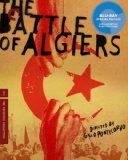| Reviews & Columns |
|
Reviews DVD TV on DVD Blu-ray 4K UHD International DVDs In Theaters Reviews by Studio Video Games Features Collector Series DVDs Easter Egg Database Interviews DVD Talk Radio Feature Articles Columns Anime Talk DVD Savant Horror DVDs The M.O.D. Squad Art House HD Talk Silent DVD
|
DVD Talk Forum |
|
|
| Resources |
|
DVD Price Search Customer Service #'s RCE Info Links |
|
Columns
|
|
|
Battle of Algiers: The Criterion Collection, The
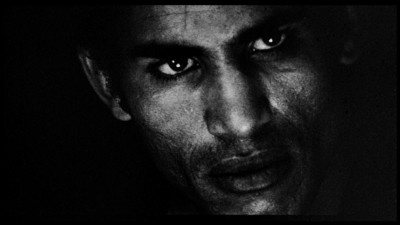
Please Note: The screen captures used here are from the standard-definition DVD released in 2004, not from the Blu-ray edition under review.
The newly released Criterion Blu-ray edition of Gillo Pontecorvo's The Battle of Algiers affords a not-to-be-missed opportunity to rediscover the power that this film still has to captivate and awe; it is astounding how cinematically fresh and geopolitically relevant it continues to feel. Like some glorious offspring of 1940s Italian Neorealism and the French New Wave of the 1950s brought to bear on the anticolonialist politics of the 1960s, the film--with its literally gritty, on-the-street realism, sharp and insouciant editing, and sheer old-fashioned suspense, action, and violence--must have seemed, upon its release in 1966, like the perfect melding of its historical/cultural moment and everything exciting about the cinema that had come before. And, although the outcome of the Algerian struggle for independence from France that is reenacted in the film has been in the history books for decades now, it remains as suspenseful as ever, not to mention chock-full of the kind of controlled but kinetically thrilling filmmaking that can only be executed by a creative team possessed of tremendous skill and energy.
Indeed, its energy is The Battle of Algiers's most immediately impressive quality, deriving from the combination of DP Marcello Gatti's deceptively casual-seeming and raw-looking cinematography (on original release prints, an opening title card read, "not a single frame of documentary or newsreel footage has been used"--it's that easy to mistake for "real") and Mario Morra's taut, tension-maximizing editing; of all the great European cinema from the heady '60s, this one stands out for the rapidity of pace necessitated by its structure of accelerating confrontation. Rather than focusing on the Algerians' ultimate liberation from French occupation in 1962, the film takes us through the buildup to that final victorious push, zeroing in on the progressively worsening mid-to-late-1950s cycle of Algerian rebellion and French clampdown--a long-simmering conflict beginning with concerted attacks by Algerians on abusive French police and the inevitable French reprisals and, over the course of several years, evolving into a full-blown war for Algerian independence.
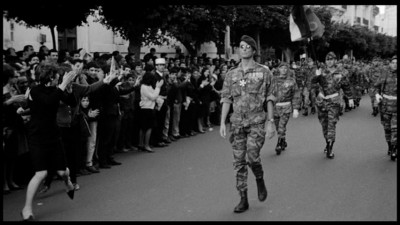
After World War II, Algerians (who had seen many of their own sacrifice their lives for the French during the war) were more aware than ever of the injustice of the French occupation that had gone on for over a century; they lived under an oppressive, minority-rule, quasi-apartheid system, and we can see quite plainly in the film that Algiers--the country's capital city and population center--was divided into a gentrified, spacious, prosperous European quarter and an impoverished, crumbling, crowded "casbah" or slum designated as the Arab/Muslim area. This visual evidence is thanks to Pontecorvo's having shot The Battle of Algiers in the city's actual European quarter and casbah--just one of his many strategies for a meticulously faithful re-creation of the world where his story occurred. When we use the loaded word "realistic," we usually just mean "naturalistic" or "convincing," but--not only because of the technically resourceful deployment of black-and-white film stock and the vérité visual approach, but also due to Pontecorvo's obsession with casting just the right faces and his preternatural ability to corral crowds of extras--this one really does feel like watching historical events that were shot as they actually happened. Commentators and Pontecorvo himself have spoken of the "dictatorship of the real" under which his shoots took place, and that painstaking commitment manifests itself in the film through real-location sets, newsreel/documentary-style camerawork (often handheld, always with a sense of the immediate and spontaneous), and the use of non-actors, mostly Algerians who had themselves lived through the film's events only a few years before. I am not at all of the school that kowtows to any definition of realism as some unquestionably paramount cinematic virtue--I admire Peter Greenaway and Douglas Sirk far too much for that--but when it comes to The Battle of Algiers, "realistic" and "authentic" really are accurate descriptors and unqualified compliments.
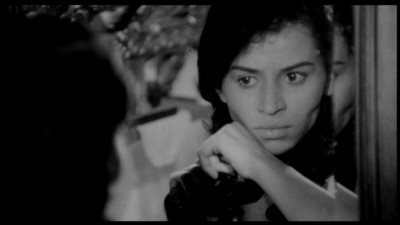
As the film "documents" the escalation of tensions between the Algerian rebels and their French occupiers--who are absolutely unwilling to give up a possession that, in their eyes, has become a true province of France--Pontecorvo and his co-screenwriter, Franco Solinas (loosely adapting a book by real-life Algerian rebel Saadi Yacef, whose appearance in a supporting role lends even further verisimilitude), set up two primary characters as poles around which to amass the struggle's opposing sides: Ali La Pointe (Brahim Haggiag), a young casbah resident who is poor, illiterate, and persecuted by racist French cops and citizens as he ekes out his meager living as a small-time con artist on the streets of Algiers; and Colonel Mathieu (Jean Martin, the only principal actor who is a professional), a decorated WWII veteran and French military hero who leads the retaliatory march of paratroopers into Algeria after the rebel attacks start costing too many French lives. In a great, wordless scene, La Pointe, jailed for one of his petty crimes, witnesses the prison-yard execution by guillotine of an Algerian rebel (an illegal execution if one considers political prisoners to be prisoners of war, and the Algerians certainly saw their cause as a war for independence). This sequence is so confidently, precisely shot and edited, all it takes for us to realize and understand La Pointe's radical politicization is the devastating zoom-in to his horrified eyes as we hear the blade come down.
In another very intense, deservedly famous sequence, set to propulsive traditional Algerian music, a group of young female rebels, committed Muslims, take the drastic measure of donning Western clothing and makeup in order to infiltrate the European quarter, where, as acts of political terrorism, they intend to plant bombs in milk bars and dance halls--blissfully ignorant civilian leisure-time centers. This takes us into some ethically queasy territory, to be sure, and to its credit, the film does not neglect the blood-stained ruthlessness and moral vertigo of warfare. Pontecorvo was decidedly left-leaning and anticolonialist, but he was not a mere propagandist, and the film allows the French case to be heard, as well (particularly cogent is the observation that the French soldiers are only the pawns of the administration back home). But, as history has proved, the French were in the wrong, and because we are shown in some uncomfortable detail that their reconnaissance-focused strategy against the Algerians involved unabashed, systematic torture as an interrogation method, we understand the difficult but, in their minds, necessary decision of the Algerians to attack the French in a way that really hurt.
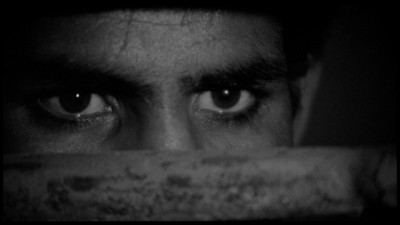
That brings us to The Battle of Algiers's crowning achievement, which is that it works equally well as a riveting, action-packed thriller and as a politically, morally, and philosophically sound historical exploration. It has two levels of suspense: not just the more usual kind that it so expertly builds up within sequences as we follow the logistics of asymmetric guerrilla warfare, getting through blockades and planting bombs, etc., but also a much more unique variety that you could call "moral suspense," as the film, committed as it is to honestly and fairly representing its characters and events, walks a tightrope between the explosive action of the face-off between oppressed and oppressor and the moral responsibility faced not just by the torturing, exploitative, ignorant-at-best French, but by the rebels, as well. Even as he never lets us forget the justness of the Algerians' cause, Pontecorvo does not let his heroes (or us) off of the emotional hook as they plant their bombs while observing the smiling, carefree faces of the happy civilians whom they know will soon be injured or killed as a direct result of their actions, however justified. The flawless manner in which Pontecorvo, his gifted and agile crew, and the film's huge cast of non-professionals pull off that balancing act at every step makes The Battle of Algiers not just a great political film or a great European film, but one of the greatest, most important, and most instantly accessible of all movie masterpieces.
THE BLU-RAY:
The excellent 1080p/AVC-MPEG4, 1.85:1 aspect ratio, anamorphic transfer retains every nuance of The Battle of Algier's rough 'n ready, grainy, black-and-white, newsreel/documentary-inspired cinematography; exteriors are naturally grittier-looking than interiors, which have comparatively more smoothness to the image. Altogether, this is a transfer that was clearly done with the care we have come to expect from the ever-reliably-picky cinephiles at Criterion.
Sound:As one would expect in a film of this type and vintage, there are sound limitations to the original elements, not least of which is the notorious Italian penchant for dubbing (not as bad here as in many other great Italian films, but all Arabic dialogue seems to have been looped). Most of the French dialogue was recorded direct, however, and the occasional distortion as the sound seems to overwhelm the recording equipment (especially in crowd scenes) only enhances the film's newsreel/documentary feel. Ennio Morriccone's indelible score comes through just fine; overall, the uncompressed PCM monaural soundtrack represents a very careful, true, solid re-creation of the film's sonic dimension.
Extras:The new Blu-ray edition contains the same generous (even by Criterion standards) treasure trove of extras from their deluxe 2004 DVD release. A run-down:
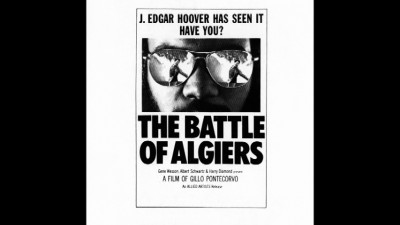
--Marxist Poetry: The Making of "The Battle of Algiers", an hour-long documentary created for Criterion in which Pontecorvo, Solinas, Yacef, Morricone, Gatti, and Morra share their impressions from the singular experience--including screenwriting, development, and shooting--of creating The Battle of Algiers, with additional input by Pontecorvo's biographer, Irene Bignards, and prominent Italian film critic/festival organizer Tullio Kezich.
--Gillo Pontecorvo: The Dictatorship of Truth, a documentary from 1992 with the venerable literary critic/international-culture expert Edward Said offering commentary and introducing interview footage of Pontecorvo, Morricone, et. al. (many of the same group from the newer documentary, plus other intimates of Pontecorvo); this piece focuses on the difficulty Pontecorvo has had in getting films made post-The Battle of Algiers, both because of his own cold feet and because of the shifting attitudes toward the kind of politically committed films he is most drawn.
--Five Directors, a set of interviews conducted for the Criterion release, featuring disparate filmmakers--Spike Lee, Julian Schnabel, Mira Nair, Steven Soderbergh, and Oliver Stone--offering their own personal interpretations and appreciations of Pontecorvo's influential film.
--Remembering History, a 50-minute documentary on the French-Algerian War from the point of view of the Algerian resistance. Included are additional interview clips with Yacef as well as other first-person accounts from the fight for Algerian independence, and explication/commentary from several historians (the most familiar of which is Alistair Horne, who wrote A Savage War of Peace, perhaps the definitive primer/introduction on the war).
--État d'armes, an excerpt from the French TV documentary series L'ennemi intime, concentrated on the French military personnel involved in the Algerian retaliation and dissecting French military tactics and actions, with both archival and new interview footage of surviving soldiers and commanders. Here we can see living proof that atrocious violence also damages, maybe forever, those who inflict it; the old men interviewed are permanently conscience-stricken at best, and some seem emotionally damaged still by the inhumane orders they followed decades ago. This segment also works as an enlightening microcosm of the French national shame over Algeria--a shame that explains in large part the film's suppression in France, where it never played publicly until Louis Malle brought it to Paris in 1971.
--The Battle of Algiers: A Case Study, a 25-minute mini-symposium recorded in 2004 and moderated by ABC News's Christopher Isham and featuring former White House counterterrorism experts Richard A. Clarke and Michael Sheehan. This clear-headed, insightful, sober discussion of the logistics and strategies of terrorism and counterterrorism efforts--a conversation that sometimes directly compares the then-recent U.S. invasion of Iraq to the events depicted in the film--is a bit of troubling but essential context that reinforces the film's continuing relevance.
--Gillo Pontecorvo's Return to Algiers, a 1992 episode of the Italian TV program Mixer, in which Pontecorvo, in the role of the show's "special correspondent," revisits Algiers and catches us up on the country's history since winning independence. Its journey has not been an easy one; dictatorships, corruption, and civil wars have consistently threatened the nation's stability and its citizens' safety. As often happens in the face of economic disparity and widespread misery and uncertainty, violent religious fundamentalism rears its insidious head (not long before Pontecorvo's visit, Algeria's radical Islamic fundamentalist party would have won power over the nation if the election results had not been annulled--a troubling situation for freedom and democracy). There was also the unfortunate mid-production coincidence of the June 1992 political assassination of Algeria's popular, democratically-minded President Mohamed Boudiaf (an FLN founder who went into exile rather than accept a one-party dictatorship's replacing French occupation), an event that apparently necessitated some last-minute changes/additions to the episode. The Mixer piece is engrossing and works to recontextualize The Battle of Algiers's story as but one installment in a long series of struggles that, despite the film's ending on an optimistic note, has, sadly, yet to find anything like closure.
--Two trailers: one from the film's original theatrical release trailer, the other for Rialto Pictures' 2004 re-release.
--A gallery of production stills.
--On top of all of that, a thick, novella-length booklet (magnificently designed with plenty of piercing, lovingly reproduced stills from the film) includes a celebratory essay by professor Peter Matthews; a bluntly written yet somehow very moving excerpt from Yacef's personal memoir of the war (an initial source for the film); a scene from a screen treatment by Yacef that was rejected in favor of Pontecorvo and Solinas's screenplay; an in-depth 1973 interview with Solinas in which he explains some of the thinking behind his and Pontecorvo's script; thumbnail biographies of some of the most prominent names related to the French-Algerian War; and a short but sophisticated bibliography of recommended further reading on the subject.
FINAL THOUGHTS:Gillo Pontecorvo's The Battle of Algiers has its politics and history to impart, but it is difficult to think of many other historically/politically-oriented films that are this purely entertaining while still retaining their full integrity and moral equilibrium (Costa-Gavras's Z, perhaps). It has an important story to tell about colonialism, occupation, and warfare that is so astute and perennially applicable that the Pentagon even screened it in the lead-up to the Iraq invasion (evidently, something vital about the film's overall observation was lost on them). But it is also a fast-paced, action-packed film that manages to be at once visceral, emotional, and cerebral, and neither your knowledge of world cinema nor your Blu-ray collection is complete without it. DVD Talk Collector Series.
|
| Popular Reviews |
| Sponsored Links |
|
|
| Sponsored Links |
|
|
| Release List | Reviews | Shop | Newsletter | Forum | DVD Giveaways | Blu-Ray | Advertise |
|
Copyright 2024 DVDTalk.com All Rights Reserved. Legal Info, Privacy Policy, Terms of Use,
Manage Preferences,
Your Privacy Choices | |||||||









